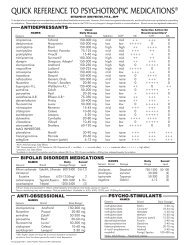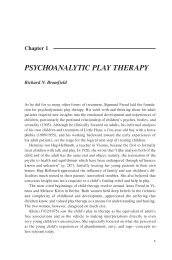IRAQ WAR CLINICIAN GUIDE
Iraq War Clinician's Guide - Network Of Care
Iraq War Clinician's Guide - Network Of Care
You also want an ePaper? Increase the reach of your titles
YUMPU automatically turns print PDFs into web optimized ePapers that Google loves.
Iraq War Clinician Guide 17 Military Personnel<br />
The service member may also receive a recommendation for an administrative discharge, or<br />
referral to a Medical Evaluation Board. The disposition is determined by the nature and severity of<br />
symptoms, as well as the treatment resources available in theater. Combat psychiatrists work with<br />
commanders to encourage return to duty and provide treatment while remaining at duty. Currently<br />
deployed psychiatrists report good success in treating ASD, PTSD, and depressive disorders with<br />
SSRls and short-term benzodiazepines. Only those military patients with psychotic symptoms,<br />
bipolar disorders and suicide risk are evacuated to a higher echelon of care.<br />
Demobilization-post-deployment screening. When service members return from deployment,<br />
regardless - of whether due to normal troop rotation, medical evacuation, or for administrative<br />
reasons, they receive a comprehensive screening evaluation for presence of medical and<br />
psychiatric illness. This DOD-mandated Post-Deployment Health Assessment (DD Form 2796) is<br />
performed either at the demobilization (DEMOB) site, or if a patient has been medically<br />
evacuated, at the Military Medical Center. This screening includes questions about depression,<br />
PTSD, and substance abuse. Individuals who screen positive are referred within 72 hours for a<br />
definitive mental health evaluation.<br />
Service members with identified disorders are offered treatment and are evaluated for appropriate<br />
disposition. In the absence of non-psychiatric conditions, aggressive treatment continues with the<br />
goal of retaining the individual and returning him or her to full duty. Service members are given an<br />
adequate trial of treatment before a decision is made to refer to the disability system through a<br />
MEB unless other conditions mandate referral to MEB.<br />
Medical Evaluation Board. If a service member requires evacuation from the combat zone for<br />
combat stress symptoms, the psychiatrist must decide whether the symptoms are due to a<br />
psychiatric condition, situational problem, or personality disorder. The psychiatrist must also<br />
determine the prognosis and likelihood of response to treatment. Generally, in the absence of a<br />
personality disorder or other confounding variables, aggressive treatment of combat stress<br />
reactions is indicated. If the symptoms cannot be stabilized within a reasonable amount of time,<br />
then referral to a MEB is indicated for disability retirement.<br />
In deciding whether and when to initiate a MEB, the treating psychiatrist must consider the military<br />
patient's length of service, previous history, current symptoms, prognosis, as well as the time<br />
remaining on active duty for activated reservists. Junior ranking military members in their first<br />
enlistment with no prior deployment experience are likely to be referred to MEB. More seasoned<br />
military members are more likely to be monitored for up to one year with some duty limitations in<br />
an effort to retain them. Reservists who are nearing the end of their term of activation are likely to<br />
be allowed to be released from active duty (REFRAD) and referred for continued care and<br />
monitoring.<br />
A service member may require referral to a MEB by virtue of his or her other medical conditions<br />
When this is the case, a psychiatric addendum is performed to establish a service-connected<br />
condition, and to identify if the condition meets or does not meet medical retention standards.<br />
One has to remain cognizant of the individual who may be attempting to manipulate the disability<br />
system in his or her favor by exaggerating symptoms, or seeking disability for conditions that are<br />
not medically unfitting. The psychiatrist must be mindful of all motivating factors and the potential<br />
for the influence of a disability seeking culture.<br />
DEPARTMENT OF VETERANS AFFAIRS<br />
NATIONAL CENTER FOR PTSD




